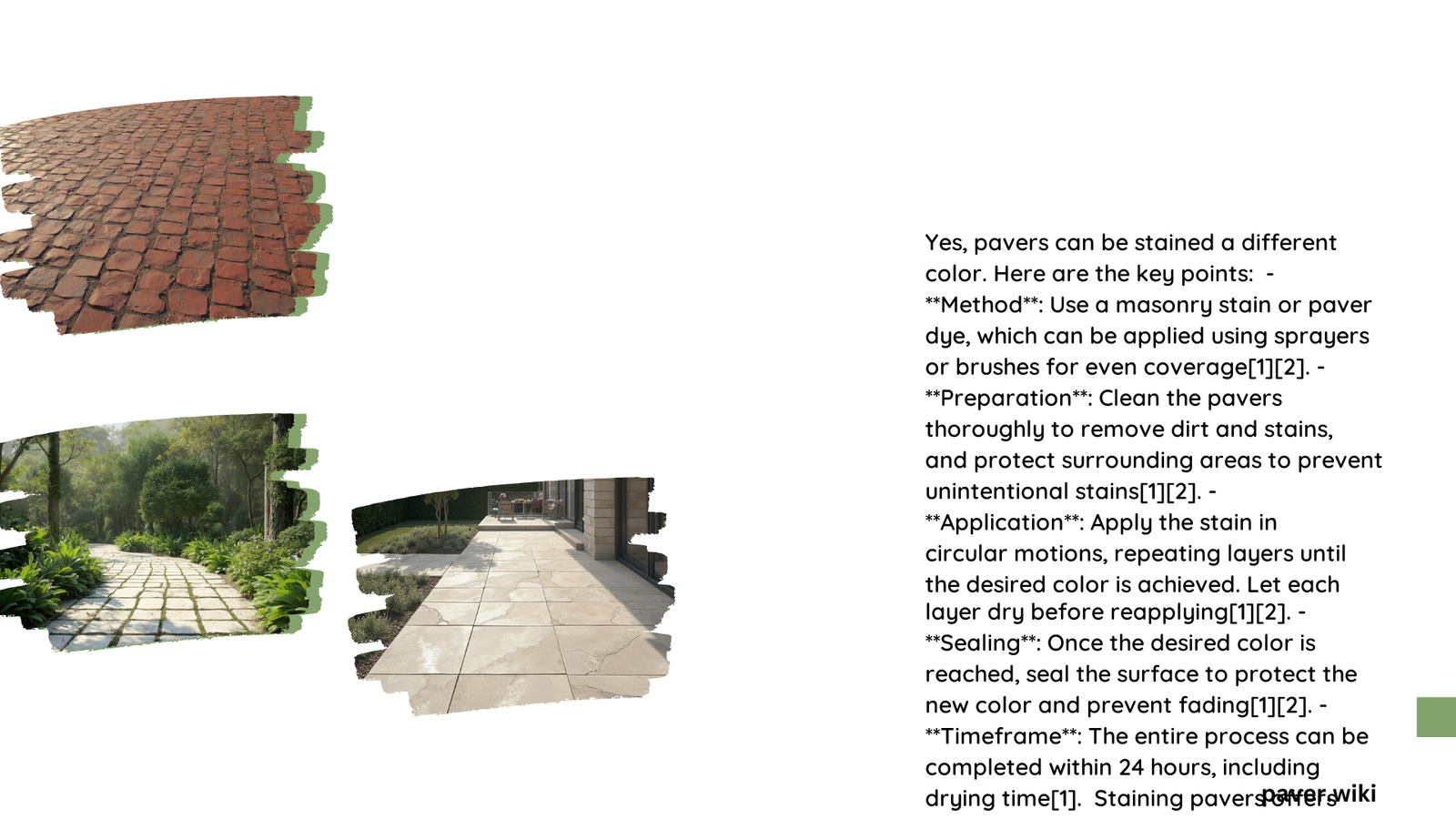Pavers can indeed be stained a different color, offering homeowners a cost-effective way to refresh their outdoor spaces. This process involves applying specialized stains to existing pavers, allowing for a dramatic transformation without the need for replacement. Staining pavers can enhance their appearance, protect them from wear, and extend their lifespan. However, successful paver staining requires proper techniques, suitable products, and careful consideration of factors such as surface preparation and environmental conditions.
What Are the Techniques for Staining Pavers?
Staining pavers involves several key steps to ensure a successful and long-lasting color change:
- Surface Preparation
- Clean the pavers thoroughly
- Remove any existing sealants or coatings
-
Allow the surface to dry completely
-
Stain Application
- Choose an appropriate stain (acrylic-based, penetrating, or solvent-based)
- Apply evenly using a pump sprayer or roller
-
Work in small sections to maintain consistency
-
Drying and Sealing
- Allow each coat of stain to dry fully
- Apply a compatible sealer for protection
- Observe proper curing times before use
What Color Options Are Available for Paver Staining?

The color options for staining pavers are extensive, allowing for significant customization:
| Stain Type | Color Range | Characteristics |
|---|---|---|
| Acrylic-based | Wide variety | Semi-transparent, easy application |
| Penetrating | Earth tones | Natural look, soaks into paver |
| Solvent-based | Rich, deep colors | Excellent durability |
| Water-based | Varied palette | Eco-friendly, easy cleanup |
Popular color choices include:
– Gray tones for a modern look
– Warm earth tones for a natural aesthetic
– Bold colors for accent areas
What Is the Best Stain for Pavers?
The best stain for pavers depends on several factors:
- Durability Requirements
- High-traffic areas need more durable stains
-
Consider UV resistance for sun-exposed pavers
-
Desired Finish
- Matte vs. glossy appearance
-
Transparent vs. opaque coverage
-
Environmental Considerations
- VOC content
- Water-based options for eco-friendly projects
Top recommendations often include high-quality acrylic-based stains with UV inhibitors and products specifically formulated for exterior use on concrete pavers.
How Long Does Paver Stain Last?
The longevity of paver stain depends on various factors:
- Quality of Stain and Application
- Professional-grade stains typically last longer
-
Proper application techniques enhance durability
-
Environmental Exposure
- Sun, rain, and temperature fluctuations affect lifespan
-
Covered areas may retain color longer
-
Traffic and Use
- High-traffic areas may show wear sooner
- Regular maintenance can extend stain life
On average, well-applied paver stains can last 2-5 years before needing reapplication. However, this can vary significantly based on the factors mentioned above.
How to Prepare Pavers for Staining?
Proper preparation is crucial for successful paver staining:
- Cleaning
- Use a pressure washer to remove dirt and debris
- Apply a specialized paver cleaner for tough stains
-
Allow sufficient drying time
-
Repairs
- Fill cracks or chips with appropriate materials
-
Replace severely damaged pavers
-
Testing
- Perform a water absorption test to ensure porosity
- Apply stain to a small, inconspicuous area to check color and adhesion
What Are the Common Mistakes in Paver Staining?
Avoid these common pitfalls when staining pavers:
- Inadequate Surface Preparation
- Skipping thorough cleaning
-
Not allowing sufficient drying time
-
Improper Stain Application
- Applying too thick or too thin coats
-
Not maintaining a wet edge during application
-
Neglecting Weather Conditions
- Staining in direct sunlight or extreme temperatures
-
Not accounting for rain in the forecast
-
Skipping the Sealing Step
- Failing to protect the stained surface
- Using incompatible sealers
How to Maintain Stained Pavers?
Proper maintenance can significantly extend the life of stained pavers:
- Regular Cleaning
- Sweep or blow debris regularly
-
Use mild soap and water for routine cleaning
-
Avoid Harsh Chemicals
- Steer clear of acidic or abrasive cleaners
-
Test new cleaning products in an inconspicuous area
-
Resealing
- Apply a fresh coat of sealer every 2-3 years
-
Address any wear or fading promptly
-
Spot Treatments
- Touch up areas of high wear as needed
- Blend new stain carefully with existing color
By following these guidelines, homeowners can successfully stain their pavers a different color, revitalizing their outdoor spaces and extending the life of their hardscaping investments.
References:
1. Direct Colors – Staining Concrete Pavers
2. Tropical Paver Sealing – How Long Does Paver Sealer Take to Dry?
3. This Old House – How To Restore Faded Pavers: A Comprehensive Guide
